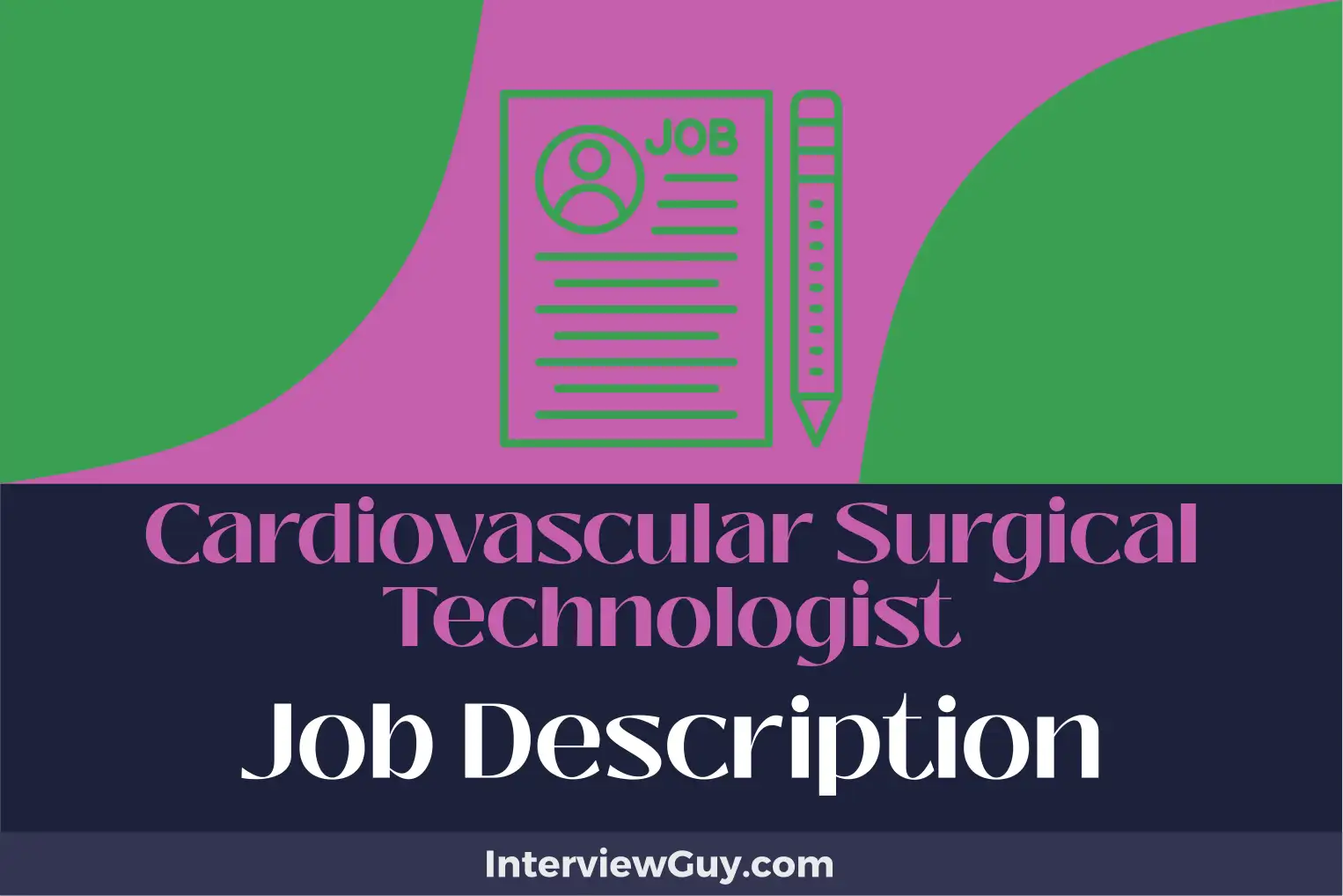Cardiovascular Surgical Technologist Job Description [Updated for 2026]

In the cutting-edge world of healthcare, the demand for Cardiovascular Surgical Technologists is more prevalent than ever.
As technology advances, so does the need for skilled professionals who can navigate, enhance, and ensure the safety of our medical procedures.
But let’s delve deeper: What’s truly expected from a Cardiovascular Surgical Technologist?
Whether you are:
- A job seeker trying to understand the core of this role,
- A hiring manager outlining the perfect candidate,
- Or simply captivated by the intricacies of cardiovascular surgical technology,
You’re in the right place.
Today, we offer you a versatile Cardiovascular Surgical Technologist job description template, designed for effortless posting on job boards or career sites.
Let’s dive right into it.
Cardiovascular Surgical Technologist Duties and Responsibilities
Cardiovascular Surgical Technologists play a critical role in the operating room, assisting surgeons during open-heart surgeries, such as bypasses and repairs or replacements of heart valves.
They also assist in procedures such as angioplasty, cardiac catheterization, or pacemaker and defibrillator implantation.
Their primary responsibilities include:
- Assisting the surgeon during cardiovascular procedures
- Setting up the operating room with all needed tools and surgical equipment
- Ensuring all surgical instruments are clean, sterile and ready for use
- Handing instruments and other sterile supplies to surgeons and surgeon assistants during operations
- Operating, adjusting, or monitoring equipment used during cardiovascular procedures
- Conducting pre- and post-operative patient care, such as wound care and drug administration
- Keeping detailed and accurate documentation of the surgical procedure
- Working with other medical professionals, such as anesthesiologists and registered nurses, to ensure a successful surgery and recovery
Cardiovascular Surgical Technologist Job Description Template
Job Brief
We are seeking a skilled Cardiovascular Surgical Technologist to join our dynamic team.
The successful candidate will have the expertise to assist in surgical procedures, primarily in the cardiovascular department.
Your primary duties will include prepping the operating room, assisting surgeons during procedures, and ensuring patient safety.
Our ideal candidate is detail-oriented, has excellent manual dexterity, and is knowledgeable about surgical instruments and procedures.
Responsibilities
- Prepare operating rooms for surgery, including sterilizing equipment and ensuring all necessary equipment is available and in working order.
- Assist during operations, handling and supplying instruments and other materials to surgeons.
- Monitor patient vital signs during surgical procedures.
- Ensure all health and safety standards are met to maintain a sterile environment.
- Assist with patient preparation and post-operative care.
- Keep up-to-date with advancements in the field of cardiovascular surgery.
- Maintain inventory of surgical supplies.
- Document patient information and surgical procedures.
Qualifications
- Completion of an accredited Surgical Technologist program.
- Certification as a Surgical Technologist (CST) is strongly preferred.
- Experience in a cardiovascular surgical setting.
- Proficient knowledge of surgical instruments and supplies.
- Ability to work under pressure in a fast-paced environment.
- Strong communication and teamwork skills.
- Excellent manual dexterity and physical stamina.
Benefits
- 401(k)
- Health insurance
- Dental insurance
- Retirement plan
- Paid time off
- Professional development opportunities
Additional Information
- Job Title: Cardiovascular Surgical Technologist
- Work Environment: Hospital operating room setting. Must be able to stand for long periods and may need to lift heavy items.
- Reporting Structure: Reports to the Operating Room Manager or Surgeon-in-Charge.
- Salary: Salary is based upon candidate experience and qualifications, as well as market and business considerations.
- Pay Range: $45,000 minimum to $70,000 maximum
- Location: [City, State] (specify the location or indicate if remote)
- Employment Type: Full-time
- Equal Opportunity Statement: We are an equal opportunity employer and value diversity at our company. We do not discriminate on the basis of race, religion, color, national origin, gender, sexual orientation, age, marital status, veteran status, or disability status.
- Application Instructions: Please submit your resume and a cover letter outlining your qualifications and experience to [email address or application portal].
What Does a Cardiovascular Surgical Technologist Do?
Cardiovascular Surgical Technologists, also known as Cardiovascular Technologists or Cardiovascular Surgeons, play a critical role in the field of cardiac care.
Working primarily in hospitals and cardiac clinics, they assist doctors and nurses in treating patients with heart and blood vessel conditions.
Their primary duties involve preparing patients for heart surgeries and procedures by cleaning and shaving the surgical site, taking vital signs, and monitoring patients’ heart rates.
During surgery, they assist the surgeon by handing them instruments, operating heart-lung machines, and ensuring a sterile environment to prevent infections.
Cardiovascular Surgical Technologists also assist in post-operative care by monitoring patients’ recovery, changing dressings, and removing sutures.
On top of their clinical responsibilities, they also maintain surgical tools and equipment, ensuring they are in perfect working condition.
Their job requires a high level of technical skill, knowledge about the cardiovascular system, and the ability to work in high-stress environments.
Their main goal is to provide the best patient care and to support the surgical team in saving lives.
Cardiovascular Surgical Technologist Qualifications and Skills
A Cardiovascular Surgical Technologist should possess a range of technical, practical, and interpersonal skills to effectively assist in surgical operations, such as:
- Strong technical knowledge of cardiovascular surgery procedures and equipment to ensure the correct setup and operation of machinery and instruments
- Ability to work effectively in high-stress environments, maintaining composure and attention to detail during complex cardiovascular procedures
- Excellent communication skills to coordinate with surgeons, nurses, and other healthcare professionals before, during, and after surgeries
- Proficient in sterilization techniques to ensure the cleanliness and safety of the operating room and surgical instruments
- Understanding of patient care principles to provide preoperative and postoperative care under the supervision of registered nurses or surgeons
- Ability to identify and respond quickly to emergencies or complications during surgery, applying effective problem-solving skills
- Physical stamina to stand for long periods during surgeries and handle heavy equipment
- Commitment to continuous learning and staying updated about advancements in cardiovascular surgical technology
Cardiovascular Surgical Technologist Experience Requirements
To become a Cardiovascular Surgical Technologist, a significant amount of specialized education and hands-on experience is required.
Entry-level Cardiovascular Surgical Technologists typically have completed a surgical technology program accredited by the Commission on Accreditation of Allied Health Education Programs (CAAHEP).
This often involves up to 2 years of coursework, including anatomy, physiology, medical ethics, and specific study of surgical procedures.
Alongside theoretical education, these programs usually include a clinical component where students gain practical experience under supervision in a hospital or clinical environment.
After graduation, many Cardiovascular Surgical Technologists gain additional experience through a 1 to 2 year cardiovascular technologist program or related allied health field.
This can be followed by certification through the National Board of Surgical Technology and Surgical Assisting (NBSTSA), which requires ongoing education and recertification every 4 years.
For more experienced roles, candidates may need 3 to 5 years of experience working in a surgical environment, with a focus on cardiovascular procedures.
They should have developed a strong understanding of cardiovascular surgical procedures, patient care, and medical equipment operation.
Those with over 5 years of experience and advanced certification may be eligible for supervisory or managerial roles in the surgical technology field.
This may include overseeing a team of technologists, coordinating surgical procedures, or training new technologists.
Cardiovascular Surgical Technologist Education and Training Requirements
Cardiovascular Surgical Technologists typically have an Associate’s degree or a postsecondary certificate in surgical technology.
These programs, accredited by the Commission on Accreditation of Allied Health Education Programs (CAAHEP), provide practical and theoretical knowledge about surgical procedures, medical terminology, anatomy, and patient care.
A significant part of the curriculum also includes hands-on clinical experience in a hospital setting.
In some states, certification is mandatory for employment.
Two organizations that offer certification are the National Board of Surgical Technology and Surgical Assisting and the National Center for Competency Testing.
For Cardiovascular Surgical Technologists, additional specialized training may be required.
This could include a certificate or diploma in a specialized cardiovascular technologist program, which provides additional education and training specifically related to cardiovascular procedures.
Continuing education is crucial in this field due to evolving medical technologies and surgical procedures.
Therefore, many technologists pursue further study or professional development courses throughout their career.
In addition, Cardiovascular Surgical Technologists need to have strong physical stamina, excellent hand-eye coordination, and the ability to work well under pressure, as the job often involves long hours standing and the need to react quickly during surgeries.
Cardiovascular Surgical Technologist Salary Expectations
A Cardiovascular Surgical Technologist earns an average salary of $55,570 (USD) per year.
However, the exact salary can vary depending on factors such as years of experience, level of specialization, location, and the type of healthcare facility.
Cardiovascular Surgical Technologist Job Description FAQs
What skills does a Cardiovascular Surgical Technologist need?
Cardiovascular Surgical Technologists should have a keen attention to detail as they need to assist in complex surgeries and handle delicate instruments and technology.
They should have good manual dexterity and hand-eye coordination.
They also need to be physically fit as they often stand for long periods during surgeries.
Excellent communication and interpersonal skills are important, as they need to interact with surgeons, nurses and other medical professionals.
Do Cardiovascular Surgical Technologists need a degree?
Yes, a Cardiovascular Surgical Technologist needs a degree.
They typically need to complete a postsecondary educational program in surgical technology.
Programs may lead to a certificate, diploma, or associate’s degree.
Depending on the state, they may also need to be licensed or certified.
What should you look for in a Cardiovascular Surgical Technologist resume?
Look for a degree in surgical technology or a related field, as well as any relevant certifications.
They should have experience in a clinical setting, ideally in cardiovascular surgery.
It’s also important that they have knowledge of sterilization techniques, patient safety, and medical equipment.
You should also look for soft skills like attention to detail, communication skills, and physical stamina.
What qualities make a good Cardiovascular Surgical Technologist?
A good Cardiovascular Surgical Technologist is detail-oriented, ensuring no step is overlooked during the complex surgical procedures.
They are dependable and can handle stressful situations calmly and efficiently.
They should also be physically fit to stand for long periods and have the dexterity needed to handle surgical instruments.
Good interpersonal and communication skills are also important in order to work effectively in a surgical team.
Is it difficult to hire Cardiovascular Surgical Technologists?
Recruiting Cardiovascular Surgical Technologists can be challenging due to the specific skills and qualifications needed for the role.
Moreover, due to the nature of the job, the candidate must be willing to work long hours and be on call, which can limit the pool of potential applicants.
However, offering competitive salaries and opportunities for advancement can attract qualified candidates.
Conclusion
And there we have it.
Today, we’ve given you a glimpse into the heart of what it means to be a cardiovascular surgical technologist.
Surprised?
It’s not just about assisting in surgeries.
It’s about being a crucial part of life-saving operations, one surgical instrument at a time.
With our comprehensive cardiovascular surgical technologist job description template and real-world examples, you’re ready to take your next step.
But why stop there?
Explore further with our job description generator. It’s your key to creating precise job listings or refining your resume to perfection.
Remember:
Every surgical instrument is a part of a life-changing procedure.
Let’s save lives. Together.
How to Become a Cardiovascular Surgical Technologist (Complete Guide)
Out of the Box Occupations: The Weirdest Jobs in the Market
Economy-Strong Careers: Jobs Unharmed by Financial Fluctuations
The Loathsome Ladder: The Most Hated Jobs in the Career Climb
The Hidden World of High-Stress Jobs: What You Don’t See on TV!





![Firefighting Equipment Technician Job Description [Updated for 2026]](https://interviewguy.com/wp-content/uploads/2024/07/firefighting-equipment-technician-job-description-768x512.webp)
